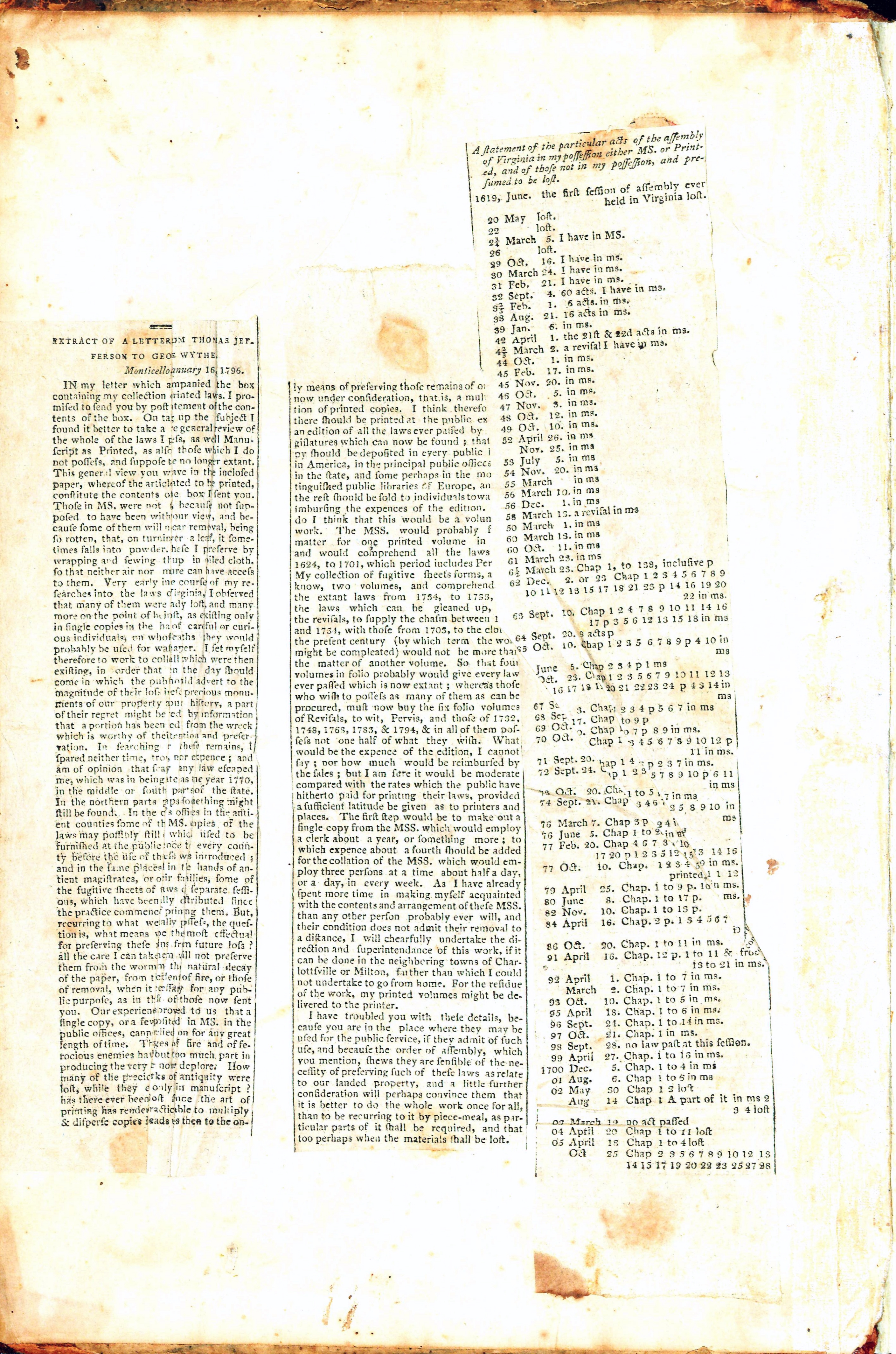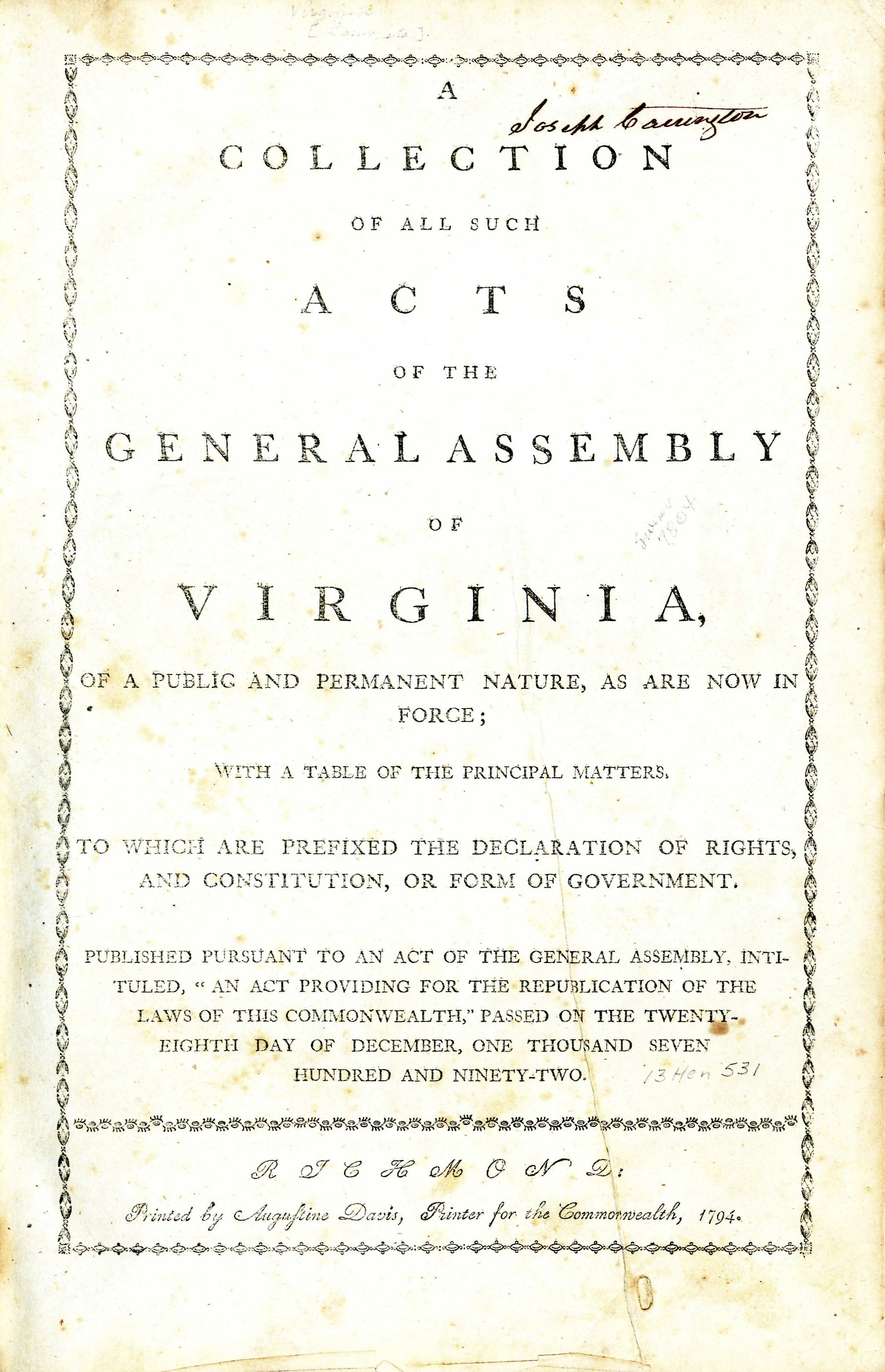A Collection of All Such Acts of the General Assembly of Virginia: of a Public and Permanent Nature as are now in Force, with a Table of the Principal Matters to Which are Prefixed the Declaration of Rights, and Constitution, or Form of Government
General Assembly of Virginia
| Acts of the General Assembly of Virginia (1794) | |
|
Title page from A Collection of All Such Acts of the General Assembly of Virginia, of a Public and Permanent Nature, George Wythe Collection, Wolf Law Library, College of William & Mary. | |
| Published | Richmond: Augustine Davis, printer for the Commonwealth |
| Date | 1794 |
| Language | English |
| Pages | 380 |
| Desc. | Folio (35 cm.) |
| Location | Shelf M-5 |
A Collection of All Such Acts of the General Assembly of Virginia was published in 1794 and authorized by a 1792 act of the General Assembly.[1] The Collection starts with a few of Virginia’s historical milestones, including the Virginia Declaration of Rights, the Virginia Constitution, and a 1748 act confirming grants made by the King.[2] The laws reflect the need for set standards in the Commonwealth, and include acts creating property rights for authors of literary works, defining the law regarding shipwrecks, and establishing a Virginia Statute of Frauds.[3]
The Collection also reflects the increasing importance of commerce in the Commonwealth, such as a 1786 act ratifying an agreement between Maryland and Virginia concerning commerce on the Chesapeake Bay and the Potomac River.[4] Other laws dealt with circulation of private bank notes, creation of roads, regulation of food, conveyance of land to the United States for the purpose of building a light house, and navigation of the James River.[5]

After independence, Virginia became increasingly concerned with the competency and virtue of its public officers, and the Collection contains numerous laws about public officials. One law, in particular, dealt with the practice of bribery and the sale of public office.[6] The General Assembly also directed its focus on reforming and standardizing the court system, and the Collection contains rules on Virginia's general, district, and county courts.[7] Importantly for George Wythe, a 1792 law concerned the High Court of Chancery that, in addition to providing the boundaries of its jurisdiction and procedure, required that the Court "shall consist of one Judge, to be chosen and commissioned in the manner as directed by the Constitution of this Commonwealth."[8] Another 1792 act provided guidelines for counsel and attorneys at law.[9] These laws may have their origin in Thomas Jefferson’s concern, reflected in earlier laws passed in 1776-1779, that "swarms of petty lawyers would corrupt the grand designs for republican law that he had in mind for Virginia."[10]
The Collection also deals with slavery and freed slaves. One act banned the importation of slaves from West Africa, the importation of freed slaves from neighboring states, and triennial registration of all freed slaves.[11] Freed men and women were required to carry a certificate confirming registration status at all times and needed the document in order to gain employment.[12]
Overall, the laws contained in the Collection reveal the concerns of lawmakers in the early years of independence and reflect the desire to regulate government, society, and commerce.
Evidence for Inclusion in Wythe's Library
The Brown Bibliography[13] suggests this may have been one of the items to which Thomas Jefferson referred in his inventory of Wythe's Library as "Laws of Virga. various edns." Jefferson kept Wythe's copies of Virginia laws, and may have sold some or all of them to the Library of Congress in 1815. He did sell a copy of the 1794 Collection, and the volume still exists. Unfortunately, it includes no inscription or other markings linking it to Wythe.[14] Brown also notes that Wythe referred to the 1794 compilation of laws in Love v. Donelson, "This section, not known by the commentator to have been repealed is supposed to be in force, although not in the act published in the collection of 1794, which, as its title importeth, was intended for a pandect of the statutes, or to contain all of them which were in it."[15] The Wolf Law Library moved a copy of this book from its general rare books collection to the George Wythe Collection.
Description of the Wolf Law Library's copy
Bound in quarter-calf with paper boards. Title page and front free endpaper signed "Joseph Carrington." Newspaper copy of letter from Thomas Jefferson to George Wythe (January 16, 1796) tipped-in on front pastedown and front free endpaper.
Images of the library's copy of this book are available on Flickr. View the record for this book in William & Mary's online catalog.
Full text
See also
- The Acts of Assembly, Now in Force, in the Colony of Virginia (1752)
- The Acts of Assembly, Now in Force, in the Colony of Virginia (1769)
- A Collection of All Such Acts of the General Assembly of Virginia (1803)
- A Collection of All Such Public Acts of the General Assembly, and Ordinances of the Conventions of Virginia (1785)
- A Collection of All the Acts of Assembly Now in Force in the Colony of Virginia (1733)
- George Wythe Room
- Jefferson Inventory
- Thomas Jefferson to Wythe, 16 January 1796 (Madison Draft with List of Virginia Laws)
- Wythe's Library
References
- ↑ A Collection of All Such Acts of the General Assembly of Virginia, of a Public and Permanent Nature, as are Now in Force: to Which are Prefixed the Declaration of Rights, and Constitution, or Form of Government (Richmond: Augustine Davis, 1794) i.
- ↑ Ibid., 1-10.
- ↑ Ibid., 14-15.
- ↑ Ibid., 23-26.
- ↑ Ibid., 16, 26, 30-31, 44, 54.
- ↑ Ibid., 56-57.
- ↑ Ibid., 69, 72, 83.
- ↑ Ibid., 63-69.
- ↑ Ibid., 96.
- ↑ A.G. Roeber, Faithful Magistrates and Republican Lawyers, (Chapel Hill: University of North Carolina Press, 1981), 167.
- ↑ A Collection of All Such Acts, 315-16.
- ↑ Ibid
- ↑ Bennie Brown, "The Library of George Wythe of Williamsburg and Richmond," (unpublished manuscript, May, 201, rev. May 2014) Microsoft Word file. Earlier edition available at: https://digitalarchive.wm.edu/handle/10288/13433.
- ↑ E. Millicent Sowerby, Catalogue of the Library of Thomas Jefferson, (Washington, D.C.: The Library of Congress, 1952-1959), 2:255 [no.1862].
- ↑ George Wythe, Love, against Donelson and Hodgson (Richmond, VA: Thomas Nicolson, 1801?), 17.
